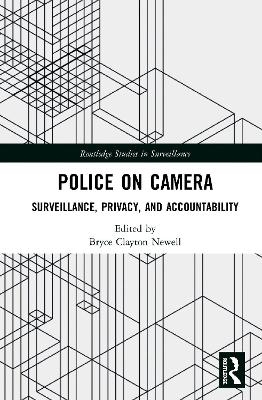
Police on Camera
Routledge (Verlag)
978-1-138-34243-9 (ISBN)
The book provides the reader with conceptual and empirical analyses of the role and impact of police body-worn cameras in society. These analyses are complimented by invited commentaries designed to open up dialogue and generate debate on these important social issues. The book offers informed, critical commentary to the ongoing debates about the implications that BWCs have for society in various parts of the world, with special attention to issues of police accountability and discretion, privacy, and surveillance.
This book is designed to be accessible to a broad audience, and is targeted at scholars and students of surveillance, law and policy, and the police, as well as policymakers and others interested in how surveillance technologies are impacting our modern world and criminal justice institutions.
Bryce Clayton Newell is an Assistant Professor in the School of Journalism and Communication at the University of Oregon. His books include Surveillance, Privacy and Public Space (2019) and Privacy in Public Space (2017; both with Tjerk Timan & Bert-Jaap Koops).
Introduction: The Ayes Have It—Should They? Police Body-Worn Cameras
Section 1: Setting the Stage: Theory and Practice
1. Taking Off the Blinders: A General Framework to Understand How Bodycams Work
2. Theorizing Police Body-Worn Cameras
3. Reading the Body-Worn Camera as Multiple: A Reconsideration of Entities as Enactments
Section 2: Accountability and Discretion
4. Can We Count on the Police? Definitional Issues in Considering the Promise of Body Worn Cameras to Increase Police Accountability
5. The Camera Never Lies? Police Body Worn Cameras and Operational Discretion
6. Does Surveillance of Officers Lead to De-Policing? A Block Randomized Crossover Controlled Trial on Body-Worn Cameras in Uruguay
7. Police Body-Worn Cameras in the Canadian Context: Policing’s New Visibility and Today’s Expectations for Police Accountability
8. Commentary: Accountability, Discretion, and the Questions We Ask
9. Commentary: Questioning Assumptions of De-Policing and Erasures of Race: A Rejoinder to Ariel’s Study of Camera-Induced Passivity Among Traffic Police in Uruguay
Section 3: Privacy and Surveillance
10. Not Just about Privacy: Police Body-Worn Cameras and the Costs of Public Area Surveillance
11. Privacy, Public Disclosure, and Police-Worn Body Camera Footage
12. The Rise of Body-Worn Video Cameras: A New Surveillance Revolution?
13. Commentary: A Republican and Collective Approach to the Privacy and Surveillance Issues of Bodycams
14. Commentary: Protecting the Rights of Citizens on Camera: Why Restricting Disclosure of Police Body Camera Footage is Better than Giving Victims Control over Recording
Conclusion: Body Worn Cameras, Surveillance, and Police Legitimacy
| Erscheinungsdatum | 19.10.2020 |
|---|---|
| Reihe/Serie | Routledge Studies in Surveillance |
| Zusatzinfo | 9 Tables, black and white; 2 Line drawings, black and white; 2 Illustrations, black and white |
| Verlagsort | London |
| Sprache | englisch |
| Maße | 156 x 234 mm |
| Gewicht | 453 g |
| Themenwelt | Sozialwissenschaften ► Soziologie |
| ISBN-10 | 1-138-34243-2 / 1138342432 |
| ISBN-13 | 978-1-138-34243-9 / 9781138342439 |
| Zustand | Neuware |
| Informationen gemäß Produktsicherheitsverordnung (GPSR) | |
| Haben Sie eine Frage zum Produkt? |
aus dem Bereich


